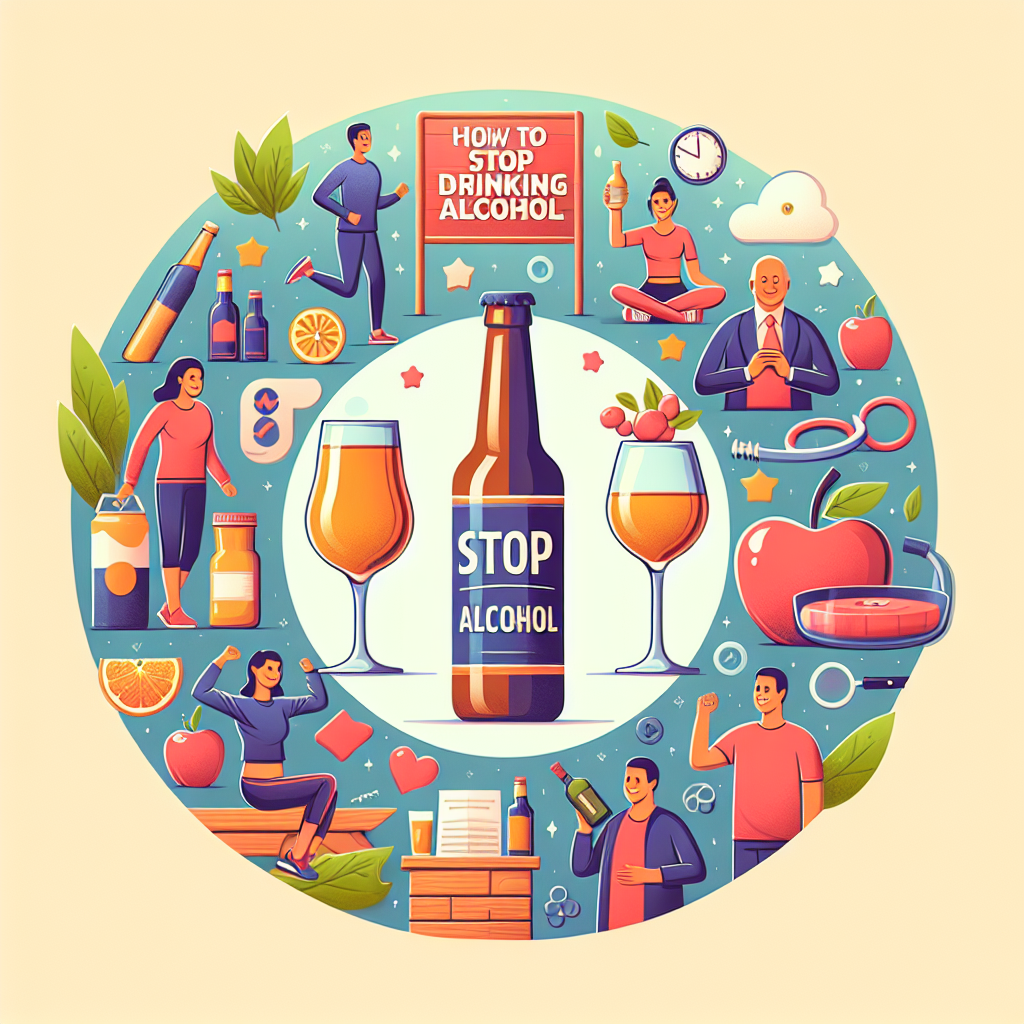-
Table of Contents

“Embrace Sobriety: Your Journey to a Healthier, Happier Life Starts Now”
Introduction
Quitting alcohol for good is a significant and commendable decision that can lead to a healthier, more fulfilling life. This journey requires a combination of self-awareness, commitment, and support. Understanding the reasons behind your drinking, setting clear goals, and seeking professional help are crucial steps. Additionally, building a strong support network, adopting healthier coping mechanisms, and making lifestyle changes can greatly enhance your chances of success. This guide will provide you with practical strategies and insights to help you navigate the path to sobriety and maintain it in the long term.
Effective Strategies to Quit Drinking Alcohol Permanently
Quitting alcohol for good is a transformative journey that requires commitment, self-awareness, and a well-structured plan. The first step in this journey is acknowledging the need for change. Recognizing that alcohol has a detrimental impact on your life is crucial. This realization often comes from reflecting on the negative consequences of drinking, such as health issues, strained relationships, or diminished productivity. Once you have acknowledged the problem, setting clear and realistic goals becomes essential. These goals should be specific, measurable, and attainable, providing a roadmap for your journey to sobriety.
Transitioning from acknowledgment to action involves creating a supportive environment. Surrounding yourself with people who understand and support your decision to quit drinking can make a significant difference. This support network can include family, friends, or support groups such as Alcoholics Anonymous. Engaging with others who have successfully quit drinking can provide valuable insights and encouragement. Additionally, professional help from therapists or counselors specializing in addiction can offer personalized strategies and coping mechanisms.
Another effective strategy is to identify and avoid triggers that lead to drinking. Triggers can be emotional, such as stress or loneliness, or situational, like social gatherings or certain places. By recognizing these triggers, you can develop alternative coping strategies. For instance, if stress is a trigger, practicing relaxation techniques such as meditation, deep breathing exercises, or yoga can be beneficial. If social situations are challenging, consider attending events where alcohol is not the focus or bringing a non-drinking friend for support.
Moreover, replacing the habit of drinking with healthier activities can significantly aid in the quitting process. Engaging in physical exercise, pursuing hobbies, or volunteering can provide a sense of fulfillment and purpose. These activities not only distract from the urge to drink but also contribute to overall well-being. Exercise, in particular, has been shown to reduce cravings and improve mood through the release of endorphins.
In addition to lifestyle changes, maintaining a balanced diet and staying hydrated are crucial. Alcohol can deplete essential nutrients and lead to dehydration, so focusing on a nutritious diet can help restore your body’s balance. Consuming foods rich in vitamins and minerals, such as fruits, vegetables, lean proteins, and whole grains, can support your physical and mental health during this transition.
Furthermore, setting up a reward system can provide motivation and a sense of accomplishment. Celebrating milestones, whether it’s a week, a month, or a year of sobriety, reinforces positive behavior. Rewards don’t have to be extravagant; they can be simple pleasures like a favorite meal, a new book, or a day trip. The key is to acknowledge your progress and stay motivated.
Lastly, practicing self-compassion and patience is vital. Quitting alcohol is a challenging process, and setbacks may occur. Instead of viewing these setbacks as failures, consider them as learning opportunities. Reflect on what triggered the relapse and how you can address it differently in the future. Remember that recovery is a journey, not a destination, and every step forward, no matter how small, is progress.
In conclusion, quitting alcohol for good involves a combination of self-awareness, support, lifestyle changes, and self-compassion. By setting clear goals, creating a supportive environment, identifying triggers, engaging in healthy activities, maintaining a balanced diet, rewarding yourself, and practicing patience, you can successfully navigate the path to sobriety. This journey, while challenging, is ultimately empowering and can lead to a healthier, more fulfilling life.
Steps to Achieve Long-Term Sobriety and Overcome Alcohol Addiction
Achieving long-term sobriety and overcoming alcohol addiction is a journey that requires dedication, support, and a well-structured plan. The first step in this transformative process is acknowledging the problem. Recognizing that alcohol has a detrimental impact on your life is crucial. This self-awareness sets the foundation for change and opens the door to seeking help. Once you have acknowledged the issue, it is essential to set clear, realistic goals. These goals should be specific, measurable, and attainable, providing a roadmap for your journey to sobriety.
Transitioning from acknowledgment to action, the next step involves seeking professional help. Consulting with a healthcare provider or addiction specialist can provide you with a comprehensive understanding of your condition and the available treatment options. These professionals can guide you through detoxification, if necessary, and help you develop a personalized treatment plan. Additionally, they can prescribe medications that may reduce cravings and withdrawal symptoms, making the initial stages of sobriety more manageable.
In conjunction with professional help, building a strong support network is vital. Surrounding yourself with supportive friends and family members can provide emotional encouragement and accountability. Joining support groups, such as Alcoholics Anonymous (AA), can also be incredibly beneficial. These groups offer a sense of community and shared experience, allowing you to connect with others who understand the challenges of addiction. The shared stories and collective wisdom within these groups can inspire and motivate you to stay committed to your sobriety goals.
As you progress, it is important to develop healthy coping mechanisms to replace the role that alcohol once played in your life. Engaging in regular physical activity, such as walking, running, or yoga, can help reduce stress and improve your overall well-being. Additionally, exploring new hobbies and interests can provide a sense of fulfillment and purpose. Whether it’s painting, gardening, or learning a musical instrument, finding activities that bring you joy can significantly enhance your quality of life and reduce the temptation to drink.
Another crucial aspect of maintaining long-term sobriety is addressing the underlying issues that may have contributed to your addiction. This often involves therapy or counseling, where you can explore the emotional and psychological factors that led to your dependence on alcohol. Cognitive-behavioral therapy (CBT) is particularly effective in helping individuals identify and change negative thought patterns and behaviors. By addressing these root causes, you can develop healthier ways of thinking and coping, reducing the risk of relapse.
Furthermore, it is essential to create an environment that supports your sobriety. This may involve making changes to your social circle, avoiding places where alcohol is prevalent, and removing alcohol from your home. Establishing a routine that includes regular sleep, nutritious meals, and time for relaxation can also contribute to a stable and healthy lifestyle.
Lastly, practicing self-compassion and patience is key. Recovery is not a linear process, and setbacks may occur. It is important to view these setbacks as learning opportunities rather than failures. Celebrate your progress, no matter how small, and remind yourself of the reasons you chose sobriety. By maintaining a positive mindset and staying committed to your goals, you can overcome alcohol addiction and achieve long-term sobriety.
In conclusion, overcoming alcohol addiction and achieving long-term sobriety is a multifaceted process that involves acknowledgment, professional help, support networks, healthy coping mechanisms, addressing underlying issues, creating a supportive environment, and practicing self-compassion. By following these steps and remaining dedicated to your journey, you can transform your life and embrace a future free from the grip of alcohol.
Q&A
1. **Question:** What are some effective strategies to stop drinking alcohol for good?
**Answer:** Effective strategies include seeking professional help such as therapy or counseling, joining support groups like Alcoholics Anonymous, setting clear and achievable goals, avoiding triggers and environments that encourage drinking, and developing healthy coping mechanisms such as exercise or hobbies.
2. **Question:** How can someone handle withdrawal symptoms when trying to quit alcohol?
**Answer:** Handling withdrawal symptoms can involve medical supervision, especially for severe cases, using prescribed medications to manage symptoms, staying hydrated, maintaining a balanced diet, getting plenty of rest, and seeking support from healthcare professionals and support groups.
Conclusion
To stop drinking alcohol for good, it is essential to acknowledge the problem, seek professional help, and build a strong support system. Developing healthy coping mechanisms, setting clear goals, and avoiding triggers are crucial steps. Consistent self-reflection and commitment to a sober lifestyle, along with possibly joining support groups like Alcoholics Anonymous, can significantly aid in maintaining long-term sobriety.



